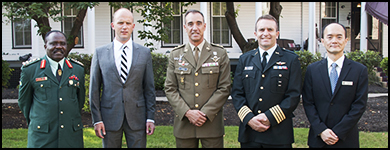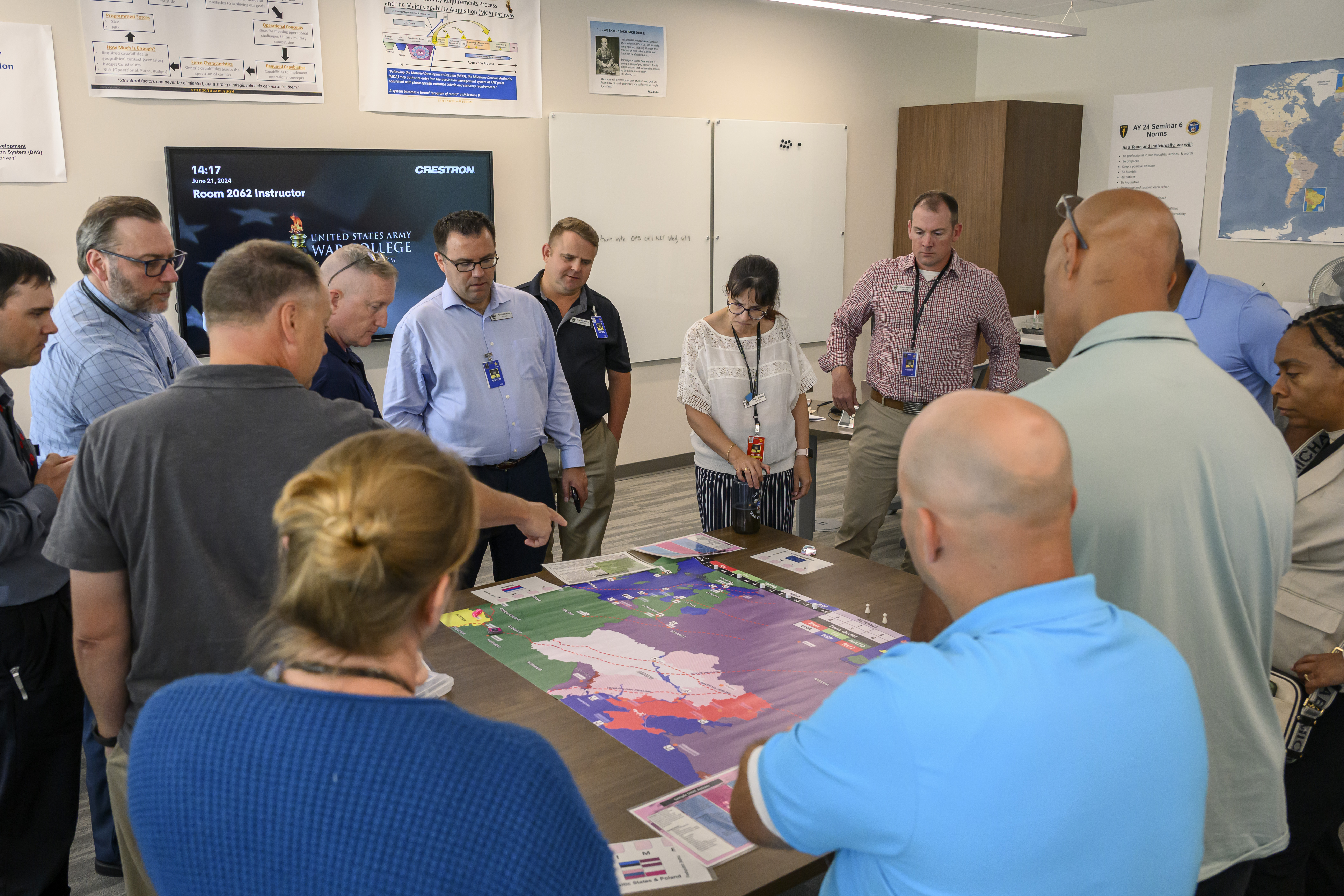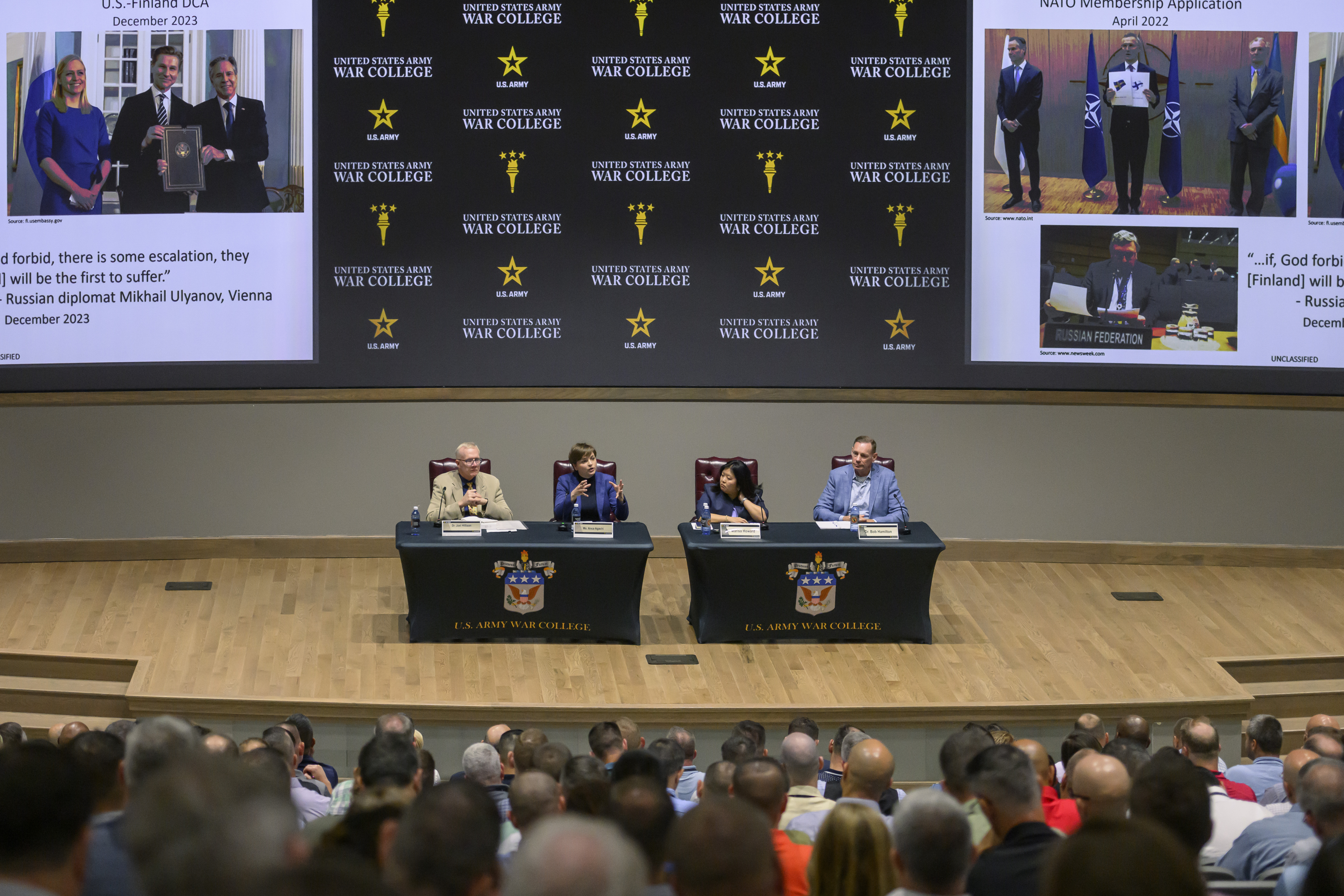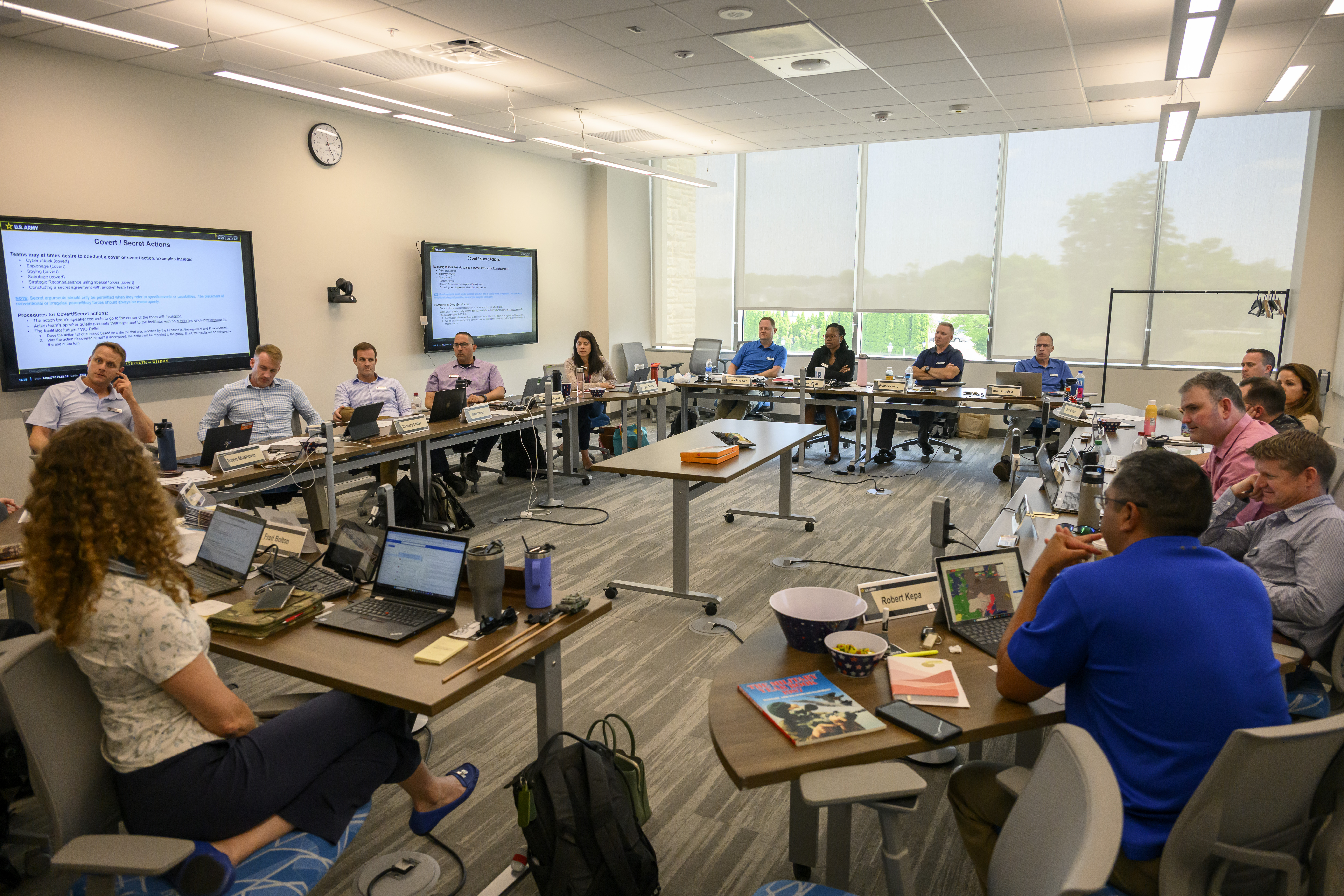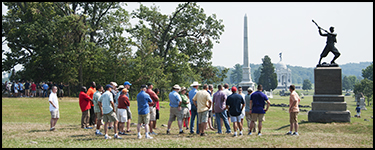Foundations Course (2 Credit Hours)
The Foundations Course introduces the foundational concepts (Civil-Military Relations) and frameworks
(Critical and Systems Thinking, Thinking in Time, and International Relations Theory) that USAWC
students require to maximize student learning within the USAWC core curriculum. It also prepares
students to perform as leaders and advisors in a dynamic strategic context. Finally, students will be
introduced to multiple assessments including journals, forums, diagnostic tests, and a short paper.
Strategic Leadership (2 Credit Hours)
The Strategic Leadership course explores the foundations of leadership and is balanced with the
theories and application of strategic leadership. As a cornerstone of the US Army War College
curriculum, this course introduces students to strategic leadership, builds a frame of reference for
the strategic environment, and examines the complexities of organizational culture and leading change
at the strategic level. The use of case studies encourages students to assess leadership theories
across various disciplines and apply those theories to organizational culture and change. Students
will continue to build upon these concepts throughout the Distance Education Program (DEP) and in
their careers.
Theory of War and Strategy (3 Credit Hours)
This course examines the history and theory of war and military strategy, providing students with a
strategic-level understanding of the military element of power. In this course, students study the
fundamental nature and evolving character of war by analyzing classical and modern theory and
historical case studies to develop strategy for contemporary military challenges. This methodology
provides students with insights about how war and conflict shape strategic thought and military
practice, and provides a foundation for examining war and formulating current and future military
strategy.
National Security Policy and Strategy (3 Credit Hours)
This foundational course to understand the United States government is focused on national security
policy and strategy making and the structures and processes that put them into operation. This course
reviews the environments - domestic, international, and strategic - in which policy and strategy
formulation occurs, the actors and institutions that formulate policy and strategy, and the
instruments of power the United States employs to pursue its national security goals and objectives.
Students examine the interagency process for developing and implementing U.S. foreign and security
policies, making the connections among the various external and domestic actors and influences at
play. Finally, students will leverage the strategy formulation process and apply these insights to
contemporary national security issues.
Regional Studies Program (2 Credit Hours)
This course examines the key strategic factors that provide opportunities and challenges for US
strategy and policymakers in a world of increasing great power competition. The focus is on viewing
issues and interests from a primarily non-US viewpoint. Students have the opportunity to select and
conduct a deeper study of one of seven world regions - the Americas, Arctic, Europe, Greater Middle
East, Indo-Pacific, Sub-Saharan Africa, or Russia/Eurasia. The course concludes with an exercise where
students build a US strategy for their focus region.
Comprehensive Examination (0 Credit Hours)
During the Comprehensive Examination, students participate in a written test at the end of the First
Year Studies online core curriculum as one measure to assess their retention and ability to
synchronize course concepts to date. Students have a two-week study period augmented by Course
Director overview sessions to review the first-year material. In the following seven days, students
respond to select questions through which they will demonstrate their synthesis and integration of
theories and concepts of the First-Year curriculum.
First Resident Course (3 Credit Hours)
For two weeks, students gather at Carlisle Barracks to expand upon the first-year curriculum,
transition to second-year curriculum, and explore topics that prepare students for strategic level
leadership. Students interact face-to-face with experts from a wide variety of fields to deepen an
understanding of the nature of strategic leadership and broaden the appreciation for the substantive
security issues confronting our nation's civilian and military leaders. This experience explores the
application of the diplomatic elements of national power and civil-military relationships in an
interagency environment. After two weeks, students return to their home station after developing their
skills to serve as strategic advisors to senior military and civilian leaders in an increasingly
complex environment.
China Integrated Course (1 credit hour)
This is a foundational second year core course and Part 1 of a 2-part focus on China and the Peoples
Liberation Army (PLA) that culminates with a wargame during the Second Resident Course. Furthermore,
the course lays the groundwork for subsequent studies in Defense Management and Military Strategy and
Campaigning. The course offers an in-depth exploration of the People's Republic of China (PRC),
examining how its history, culture, future vision, and policy preferences shape the strategic
environment. It delves into the PRC's approach to internal, regional, and international issues, and
how it leverages its national power to compete globally, particularly with the United States.
Additionally, the course covers the modernization of the People's Liberation Army (PLA) to support PRC
national interests.
Defense Management (3 Credit Hours)
Defense Management provides the student, as a future leader in the strategic environment, with
information and tools to increase his/her strategic leader technical competency and understanding of
DOD structure and function and how DOD integrates into the overall national security structure. Its
content furnishes the student with knowledge of the systems and processes that help senior national
and military leaders translate theory into military strategy, plans, actions, and resources. The
course examines the interactions of systems and processes including the Joint Strategic Planning
System (JSPS) and DOD Decision Support Systems including the Joint Capabilities Integration &
Development System (JCIDS); the DOD Planning, Programming, Budgeting and Execution (PPBE) process; and
the Defense Acquisition System (DAS).
Military Strategy and Campaigning I (3 Credit Hours)
Military Strategy and Campaigning I (MSC I) focuses on the operational strategic aspects of planning
at the theater level. Students will look at the development of theater strategy, and how it links to
the overarching guidance received from the civilian leadership. Students will also examine how the
combatant commanders implement decisions made by that civilian leadership. Finally, the course sets
the stage for theater operations by examining the capabilities of the Services, interagency
capabilities and joint logistics.
Military Strategy and Campaigning II (2 Credit Hours)
Military Strategy and Campaigning II (MSC II) utilizes the concepts covered in MSC I to address how
combatant commanders translate national and theater strategies into the precursor products required to
plan a campaign in an operational environment. Students will examine the employment of military forces
to attain theater-level strategic and operational objectives through the design, organization and
integration of theater campaigns. Students will gain an understanding of the fundamentals of campaign
planning and learn how to prepare the key planning products a joint force commander would use to
create a campaign plan.
Second Resident Course (3 Credit Hours)
The Second Resident Course (SRC) examines strategic leadership and its application to the use of
military forces in current and future warfare. Students assess and discuss the current issues facing
the defense establishment, develop a better understanding of the interaction of the elements of power,
and expand on their knowledge of the relationships between the Department of Defense and those
organizations that influence the implementation of national security strategy (e.g., interagency,
media, NGO, IO). This course is designed to be the capstone course for the Distance Education Program
which builds upon and compliments the previous two years of study.
Electives provide students with instruction in a specialized subject which will build on the knowledge
gained during the two-year program. Students are required to take two electives or a combination of
one elective and one enhanced program or research project. The list of elective course offerings
varies from year to year.
Examples
of elective courses and enhanced programs or research projects that are traditionally offered follow.
Electives:
Economics and National Security
This course introduces students to political economy, focusing on economic concepts and processes
that impact national security. It examines the political effects of economic phenomena on U.S.
national security policy. Key issues include the global economy's organization, the international
monetary system, trade, economic interdependence, and economic development in developing countries.
Airpower and Modern Warfare
Airpower and Modern Warfare introduces Distance Education students to the evolution of airpower in
warfare and its role in contemporary national security. The course covers the origins of airpower, its
historical employment, and its influence on current doctrine and strategy. Students will analyze
airpower's capabilities and limitations, and apply strategic leadership skills to evaluate its future
direction in U.S. national security policy. The course uses readings and a Blackboard forum to support
learning objectives.
Defense Support of Civil Authorities (DSCA)
A secure U.S. homeland is the Nation's top priority, supported by the Department of Defense (DOD)
through Homeland Defense (HD) and Defense Support of Civil Authorities (DSCA). DCSA covers DOD support
for domestic emergencies and law enforcement, emphasizing DSCA roles, processes, and interagency
coordination with organizations like FEMA. The course reviews Joint and Army doctrine for DSCA
operations and the legal and policy mechanisms that guide these efforts.
Energy and National Security
This course, blended with AWC resident program students, uses the World Economic Forum's "energy
security triangle" (supply, economics, environment) as a framework to explore energy's role in the
instruments of national power. Students analyze how policy choices regarding carbon-based fuels and
sustainable energy sources affect national economies, international relations, military capabilities
and readiness, climate, infrastructure, and trade. They will consider energy security from the
perspective of the United States, Europe and Russia, Asia and China, and Africa and Latin America.
Students will engage in one online discussion forum with their resident program counterparts and write
a short position paper on a topic related to energy security.
Negotiations
This course enhances personal and professional negotiation skills using principled negotiation
techniques. Students will practice and analyze negotiations from routine to complex levels, using
materials from Harvard Law School's Program on Negotiations and other sources. The course includes
Blackboard forums, negotiation exercises, and an essay.
Cyber Operations
This elective examines the strategic direction and development of Cyberspace Domain Operations and the
impact of information age technology on U.S. cyber threat deterrence. Students explore Cyberspace
policy and doctrine, focusing on command and control, tactics, and transformation. The course aims to
provide a comprehensive understanding of Cyberspace Warfare at various levels and its integration into
U.S. strategy. Students will complete a 1500-word essay on a significant aspect of Cyber Warfare.
Campaigning in the Gray Zone
This course examines the gray zone, a space between traditional war and peace, and its growing
prominence. Students will evaluate strategies for preparing and countering competition and conflict in
this area. The course provides an intellectual basis for analyzing strategic implications and includes
readings, multimedia reviews, seminar dialogue, and case studies.
Great Power Competition: Lessons from U.S. Involvement in Vietnam
This course allows students to synthesize concepts from the U.S. Army War College curriculum by
analyzing U.S. involvement in Vietnam from 1945 to 1975. Despite efforts to avoid war, the Vietnam
conflict escalated in 1965 and became the longest and most controversial U.S. conflict of the 20th
century. The course examines the war's impact on U.S. military strategy and its ongoing influence on
debates about military power. Students will draw insights applicable to current and future military
strategy.
Gods and Nations - Understanding the Religious Dimension
This course provides an overview of how the five major world religions—Judaism, Christianity, Islam,
Hinduism, and Buddhism—approach war, aiding strategic understanding of contemporary conflicts.
Students examine foundational texts and historical developments in each religion, and analyze case
studies like the Israeli-Palestinian Conflict and Salafi Jihadism. The course explores how religious
heritages influence attitudes and actions in conflicts, and evaluates scholarly findings on religion's
impact on intra- and inter-state conflicts.
Responsible Command
This course provides a forum for dialogue on command and leadership, preparing students for roles at
the 0-6 level and beyond. It challenges students to redefine the role of a commander at operational
and strategic levels. The course includes readings, discussions, online journaling, and an oral
presentation of their Command or Leader Philosophy. Written assignments and presentations help
students integrate and evaluate course materials in the context of current strategic challenges.
Navigating The Bureaucracy Domain Of Warfare
This course explores approaching the policy-making process as a sixth domain of warfare: the
bureaucracy domain. Viewing the policy development and implementation process in this way can assist
policy professionals in successfully handling its processes and procedures. Strategic leaders must
understand what the bureaucracy is, why it exists, the role it plays, and the fundamentals for
successfully navigating within it. Course participants gain deeper insights and the approaches
necessary to enable them to maintain trusted access to decision makers, provide solid and objective
advice, give realistic options and recommendations, and speak truth to power in a manner that will be
well received to the overall benefit of U.S. national security.
Enhanced Programs or Research Projects:
National Security Simulation Exercise of Competition, Crisis, and Conflict (NSEC3)
NSEC3 is a scenario-based, experiential learning exercise in which students roleplay as leaders at the
strategic and enterprise level to develop a strategic estimate and an options brief. It includes a
fifteen-session distributive phase followed by a collective phase where students will interact with
other Senior Service Colleges, the Swedish Defense University, and other international partners during
a seven-day culminating exercise at Carlisle. NSEC3 builds on the knowledge and skills introduced in
the core curriculum. Students will be assessed on a two to three page information paper, an oral
presentation/media interview based on your student role,reflective journals, and seminar contribution
to two group assignments.
Commandant's Reading Program (DCRP)
The Commandant's Reading Program broadens students' understanding of leadership through diverse
perspectives, utilizing both classic and contemporary literature. Students will develop strategic
thinking skills and participate in high-quality discussions on online forums, guided by an
award-winning author. The course involves examining, analyzing, and evaluating assigned books from a
strategic leadership viewpoint.
Leadership Ethics Program (LEP)
This course provides an ethical "sandbox" to enhance decision-making skills through the analysis of
complex issues using justified reasoning and personal reflection.
Strategic Research Requirement (SRR)
The SRR is a valuable learning experience in the education and development of strategic leaders.
Conducting research builds cognitive and communication skills expected of strategic leaders, such as
the ability to identify, structure, and scope a complex question; collect, analyze, synthesize, and
evaluate relevant information; and draw conclusions and make recommendations for a decision-maker
based on that information.




